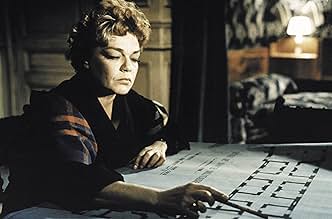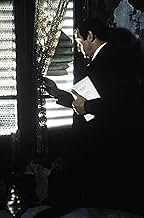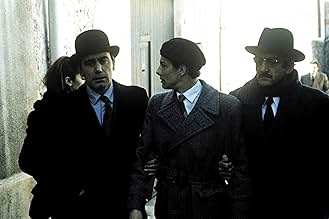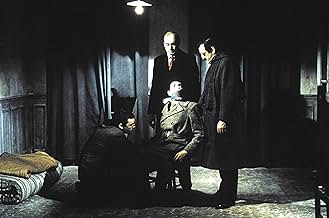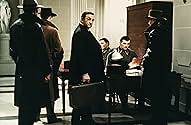AVALIAÇÃO DA IMDb
8,1/10
28 mil
SUA AVALIAÇÃO
Um relato sobre combatentes clandestinos da resistência na França ocupada pelos nazistas.Um relato sobre combatentes clandestinos da resistência na França ocupada pelos nazistas.Um relato sobre combatentes clandestinos da resistência na França ocupada pelos nazistas.
- Direção
- Roteiristas
- Artistas
- Prêmios
- 4 vitórias e 1 indicação no total
- Direção
- Roteiristas
- Elenco e equipe completos
- Produção, bilheteria e muito mais no IMDbPro
Avaliações em destaque
Jean-Pierre Melville's "Army of Shadows" is a sombre film about the French Resistance during WWII. It's yet one more movie that makes me feel like I have a terrible grasp of history, as I knew virtually nothing about the movement before seeing this. Melville himself was a member of the Resistance, so I can only assume that his film is fairly accurate. It's powerful, but not obviously so. It doesn't inspire tremendous reactions or emotions while viewing it, but it gets in your head and stays there.
The film is lacking any of that championing of the underdog spirit that infuses so many other stories about scrappy groups resisting the tyranny of the powerful. The members of the French Resistance in this film live like unearthly beings, skittering from one shadowy doorway to another, trying to erase any sign of themselves. The movie suggests that this need for non-existence bleeds into their psychology as well -- the film's main character becomes nearly inhuman in his devotion to the cause and his ability to ruthlessly do away with colleagues when there's a chance that one of them might jeopardize the others. He's not inhuman, but he must do inhuman things, because the desperation of his and his comrades' situations calls for it.
The Criterion Collection's print of the film looks terrific, or at least as terrific as the film's dreary pallet of grey and brown will allow. Melville gives the film an authentic look -- only some scenes set in the London blitz and on an aircraft carrier have a studio set look to them.
A shot of the Arc di Triomphe both opens and closes the film: a symbol of the France that would eventually emerge from the dark days of WWII, or an ironic jab at a country that can't take much credit for fighting off the tyranny of fascism?
Grade: A
The film is lacking any of that championing of the underdog spirit that infuses so many other stories about scrappy groups resisting the tyranny of the powerful. The members of the French Resistance in this film live like unearthly beings, skittering from one shadowy doorway to another, trying to erase any sign of themselves. The movie suggests that this need for non-existence bleeds into their psychology as well -- the film's main character becomes nearly inhuman in his devotion to the cause and his ability to ruthlessly do away with colleagues when there's a chance that one of them might jeopardize the others. He's not inhuman, but he must do inhuman things, because the desperation of his and his comrades' situations calls for it.
The Criterion Collection's print of the film looks terrific, or at least as terrific as the film's dreary pallet of grey and brown will allow. Melville gives the film an authentic look -- only some scenes set in the London blitz and on an aircraft carrier have a studio set look to them.
A shot of the Arc di Triomphe both opens and closes the film: a symbol of the France that would eventually emerge from the dark days of WWII, or an ironic jab at a country that can't take much credit for fighting off the tyranny of fascism?
Grade: A
Based on truth, the Army in the Shadows takes the French men and women of the Resistance as its theme, at a point near the end of the war when the Resistance movement and Nazi intelligence about its work and staff are both firmly established. As well as giving a thrilling history lesson in the workings of the Resistance, from the rural ladies who operated safe houses, to the chateaux-dwelling aristocrats whose lawns played host to light aircraft smuggling collaborators in and out of France, it also is a fascinating essay on the gruesome realities of heroism: including moments of hopelessness and complete failure of nerve. Events test our group of collaborators, so that each one bumps up against his or her personal limit, as to what they are intelligent enough to understand, brave enough to endure, and determined enough to achieve. Excellently acted and directed, it is a classic uncompromising Melville thriller.
This is a tough, somber film that captures the absurdities involved in war, and, ultimately, in life. The French Resistance "heroes" in the story are never shown conducting sabotage or planned attacks against the Germans, as one would get in a traditional World War II movie. Instead, we follow their claustrophobic and paranoid lives as they move from one hiding place to another (or one prison to another), constantly hounded by those in power, haunted by their own actions and the inability to communicate with those dear to them. Melville shows us their doubts and questions as they deal with betrayal, cowardice, and the murky ethics of killing their own to preserve the larger good.
Every episode in the film seems to lead to a darkly ironic conclusion, and the meaninglessness of their efforts becomes almost overwhelming, except that, somehow, these ordinary people continue to offer resistance in the face of death, so that their heroism lies not in the ability to stop the Germans but in taking action at all while facing the abyss.
While the acting is excellent all around, Lino Ventura's performance as Gerbier deserves special attention. It's hard to imagine any other actor bearing the tremendous weight of this film as well as he does. Gabin, at an earlier age, might have had the physical and emotional strength, but I'm not sure he would've been capable of Ventura's unassuming portrayal, which is so necessary for his character. The "shadows" at the core of this tale are seriously dark, and Ventura's Gerbier is strong enough to face them, yet modest enough to realize he can't conquer them on his own. The only way the Resistance makes sense by the end of this film, is in the collective effort of its members. Similarly, each of us, individually, cannot conquer death, but we as a group of human beings can continue to live on. _L'Armée des ombres_ ultimately moves beyond a story of the French Resistance in World War II and serves as a powerful existentialist epic, with Ventura's performance responsible for much of the film's dignity and humanity.
As with _Léon Morin, prêtre_ (1961), another story set during the war, Melville seems more emotionally present in _L'Armée des ombres_ than he does in his policiers or noir pieces, and after seeing the film, his overall body of work suddenly seems much heftier. While the movie isn't as visually daring of some of his other works, it has a dark beauty all its own, and his pacing, editing, shot selection, and use of sound show him in great artistic control. Forty-eight hours after seeing it, I still find myself caught in its world.
Every episode in the film seems to lead to a darkly ironic conclusion, and the meaninglessness of their efforts becomes almost overwhelming, except that, somehow, these ordinary people continue to offer resistance in the face of death, so that their heroism lies not in the ability to stop the Germans but in taking action at all while facing the abyss.
While the acting is excellent all around, Lino Ventura's performance as Gerbier deserves special attention. It's hard to imagine any other actor bearing the tremendous weight of this film as well as he does. Gabin, at an earlier age, might have had the physical and emotional strength, but I'm not sure he would've been capable of Ventura's unassuming portrayal, which is so necessary for his character. The "shadows" at the core of this tale are seriously dark, and Ventura's Gerbier is strong enough to face them, yet modest enough to realize he can't conquer them on his own. The only way the Resistance makes sense by the end of this film, is in the collective effort of its members. Similarly, each of us, individually, cannot conquer death, but we as a group of human beings can continue to live on. _L'Armée des ombres_ ultimately moves beyond a story of the French Resistance in World War II and serves as a powerful existentialist epic, with Ventura's performance responsible for much of the film's dignity and humanity.
As with _Léon Morin, prêtre_ (1961), another story set during the war, Melville seems more emotionally present in _L'Armée des ombres_ than he does in his policiers or noir pieces, and after seeing the film, his overall body of work suddenly seems much heftier. While the movie isn't as visually daring of some of his other works, it has a dark beauty all its own, and his pacing, editing, shot selection, and use of sound show him in great artistic control. Forty-eight hours after seeing it, I still find myself caught in its world.
This is probably one of the best fiction movies ever made on the French resistance during Worl War II. Far from the usual romantic cliches showing handsome young men playing tricks with the Nazis and falling in love with sublime women, the substance of the movie is reality. It depicts a "shadow army" made of courageous men who are ready to sacrifice their lives but are aware of the huge cost they will eventually have to pay. It shows the cruel and sometimes inhuman choices they have to make in order to survive. This is a very useful movie that gives a real hint of what resistance truly was.
If you have any interest whatsoever in French cinema, World War II, moral ambiguity, or Simone Signoret, see this film.
Filmed in a cold, documentary-like style, the "Shadow Army" tells the intertwining stories of several members of the French resistance. The movie defies any sort of simple categorization. It is a thriller without being thrilling. It is a spy story without a single gadget. It portrays the tedium of the task without being boring. Finally, it tells a story of heroic courage without the benefit of a single hero. That last point isn't immediately evident and you are free to disagree, of course, but heroes (as defined in the usual movie terms) are hard to come by in this story.
A popular adage goes; one person's terrorist is another person's freedom fighter. This movie serves up proof to that lie. There are true freedom fighters that will never be labeled "terrorist" and you will meet them during the course of this film. The movie makes clear that they, and the ones around them, paid a high price in pursuit of freedom. Not just in life and limb, but in moral conviction. As the movie unfolds, I found myself asking, is this action justified? The answer, of course, is that it most certainly is. The better question is would I, or anyone I know, have the courage to do what had to be done.
The technical aspects of the film are all first rate even though a bit below the best of European cinema at the time. (In some ways, the lack of high definition color and sets give it a feel much more in keeping with the time it portrays.) The actors disappear into their roles and there is not a star-turn to be found.
According to the announcement made before the screening I attended, it is being released in the United States on May 12, 2006, just before the summer blockbuster crush. Why that date and why now, almost 30 years after it was made, I do not know. My guess is it probably has something to do with money. (Doesn't it always?) Whatever the reasons, skip the Tom Cruise vehicle and don't miss the opportunity to see it.
Filmed in a cold, documentary-like style, the "Shadow Army" tells the intertwining stories of several members of the French resistance. The movie defies any sort of simple categorization. It is a thriller without being thrilling. It is a spy story without a single gadget. It portrays the tedium of the task without being boring. Finally, it tells a story of heroic courage without the benefit of a single hero. That last point isn't immediately evident and you are free to disagree, of course, but heroes (as defined in the usual movie terms) are hard to come by in this story.
A popular adage goes; one person's terrorist is another person's freedom fighter. This movie serves up proof to that lie. There are true freedom fighters that will never be labeled "terrorist" and you will meet them during the course of this film. The movie makes clear that they, and the ones around them, paid a high price in pursuit of freedom. Not just in life and limb, but in moral conviction. As the movie unfolds, I found myself asking, is this action justified? The answer, of course, is that it most certainly is. The better question is would I, or anyone I know, have the courage to do what had to be done.
The technical aspects of the film are all first rate even though a bit below the best of European cinema at the time. (In some ways, the lack of high definition color and sets give it a feel much more in keeping with the time it portrays.) The actors disappear into their roles and there is not a star-turn to be found.
According to the announcement made before the screening I attended, it is being released in the United States on May 12, 2006, just before the summer blockbuster crush. Why that date and why now, almost 30 years after it was made, I do not know. My guess is it probably has something to do with money. (Doesn't it always?) Whatever the reasons, skip the Tom Cruise vehicle and don't miss the opportunity to see it.
Você sabia?
- CuriosidadesCinematographer Pierre Lhomme claimed that the last surviving, watchable print of the movie had turned completely pink with age. He later supervised the 2k resolution, digital restoration of the film at the Eclair Laboratories in Paris.
- Erros de gravaçãoIn the London WWII sequence, double yellow lines are visible on the road. These were only introduced in the UK in 1956 and didn't become common until the 1960s; a few of the street signs have a style not known before the 1960s.
- Citações
Philippe Gerbier: See you, Comrade.
Legrain: You a communist?
Philippe Gerbier: No. But I do have comrades.
- ConexõesFeatured in Mémoires pour Simone (1986)
Principais escolhas
Faça login para avaliar e ver a lista de recomendações personalizadas
Detalhes
- Data de lançamento
- Países de origem
- Idiomas
- Também conhecido como
- El ejército de las sombras
- Locações de filme
- Bunker de l'armée, Saint-Cyr-l'Ecole, Yvelines, França(execution by the Gestapo)
- Empresas de produção
- Consulte mais créditos da empresa na IMDbPro
Bilheteria
- Faturamento bruto nos EUA e Canadá
- US$ 861.983
- Fim de semana de estreia nos EUA e Canadá
- US$ 12.620
- 30 de abr. de 2006
- Faturamento bruto mundial
- US$ 931.732
Contribua para esta página
Sugerir uma alteração ou adicionar conteúdo ausente





